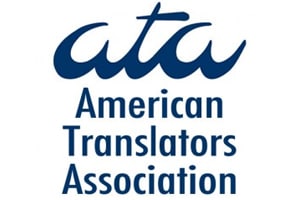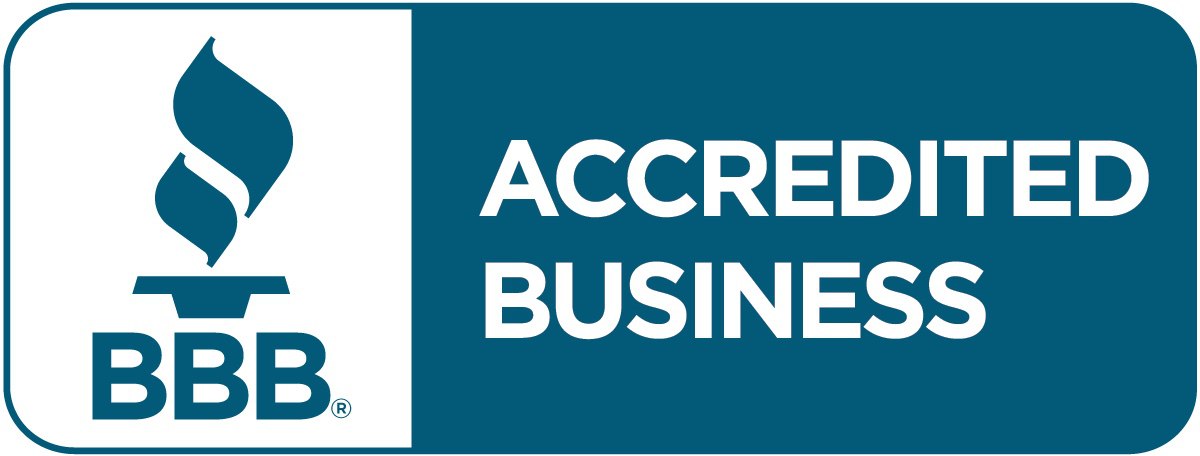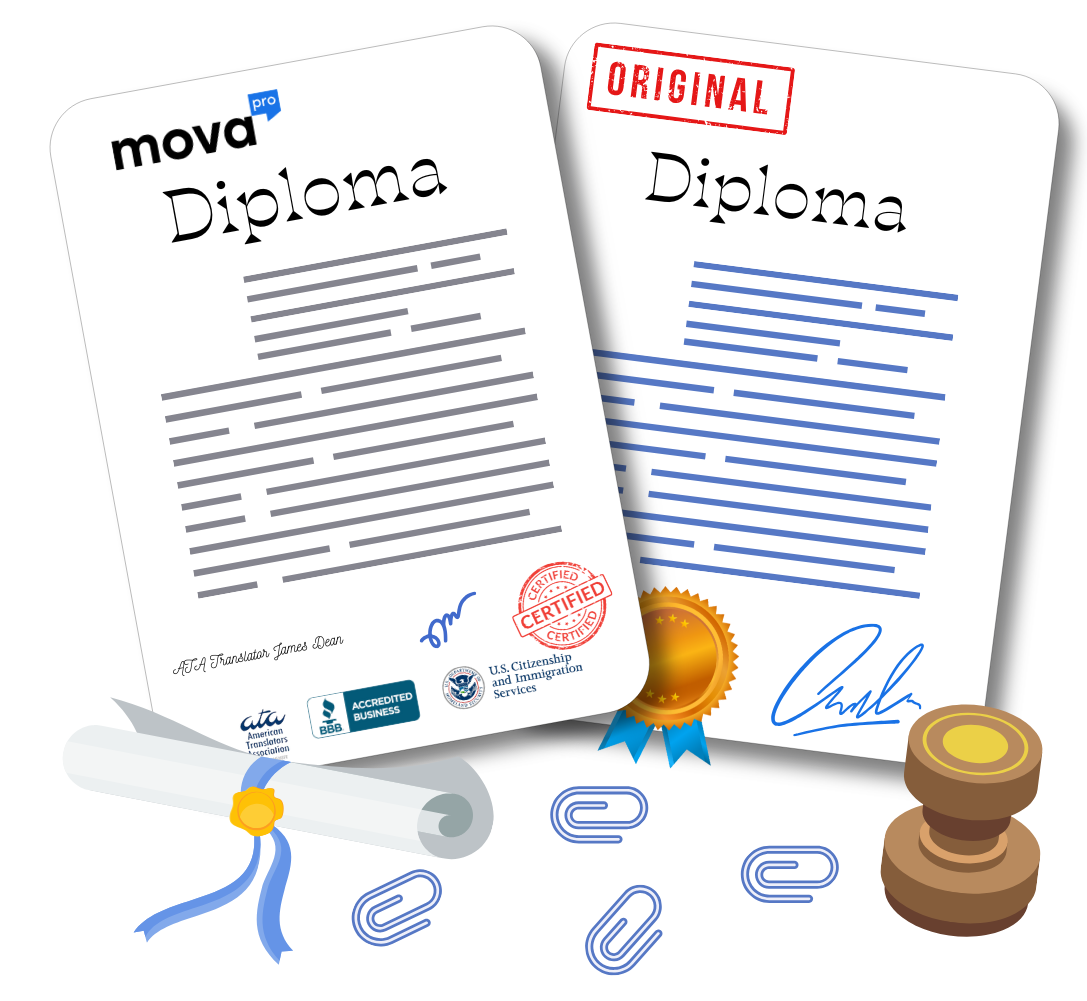Certified Academic Document Translation Services
- Affordable, transparent pricing
- Certified and notarized translations accepted globally
- Fast turnaround – documents delivered in as little as 24 hours




The Key Advantages of Using Our Certified Academic Document Translation Services
Academic Translations
We provide certified academic translations that meet international university and immigration standards.
Certified and Notarized
Notarization services are available for documents requiring additional legal or institutional validation.
Fast and Affordable
Fast, accurate translations at competitive rates ensure a smooth and cost-effective process.
Certified Academic Document Translation Services
- Our translators are native speakers familiar with educational systems worldwide.
- Accurate terminology and grade conversions to fit target country standards.
Certified and Notarized Translations
- Accepted by universities, immigration offices, and credential evaluation agencies.
- Notarization available upon request for official use.
Fast and
Affordable
- Competitive pricing starting at $25 per page.
- Most translations delivered within 24 hours.
Request a precise quote now!
Many scholars and institutions find themselves navigating the complex world of academic document translation as global education and research continue to expand. When you need to translate your academic materials, whether it’s research papers, dissertations, or institutional documents, understanding the importance of professional translation becomes imperative. Your academic success in the international arena often depends on the quality and accuracy of these translations, which require specialized knowledge and expertise to maintain the scholarly integrity of your original work.
Academic Translation Fundamentals
To excel in academic document translation, you need to understand its unique requirements and complexities. Your academic translations must maintain scholarly standards while accurately conveying complex ideas across languages. Based on recent studies, over 80% of academic publications require some form of translation to reach their intended global audience. This specialized field demands not just linguistic expertise, but also thorough knowledge of academic conventions and subject matter.
Defining Academic Translation
After identifying your translation needs, it’s important to understand that academic translation encompasses a wide range of scholarly materials. Your documents might include research papers, theses, dissertations, academic transcripts, or conference materials. According to industry data, academic translations make up approximately 25% of all professional translation services, highlighting their significance in global knowledge sharing.
Specialized Requirements
With academic document translation, you must adhere to specific formatting, citation styles, and terminology standards. Your translated work needs to maintain the original’s academic integrity while being culturally appropriate for the target audience. Research shows that 95% of successful academic translations require subject matter expertise in addition to language proficiency.
Understanding the technical aspects of your academic translation project is vital for success. You’ll need to consider factors such as discipline-specific terminology, academic style guides, and institutional requirements. Recent statistics indicate that properly translated academic documents are 60% more likely to be accepted by international journals and institutions. Your attention to these details will ensure your translated work maintains its scholarly value and credibility.
Language and Subject Matter Expertise
Now, when you’re seeking academic document translation services, you’ll need professionals who combine language mastery with deep subject matter knowledge. Your academic documents require translators who understand both the source and target languages at a native level, plus expertise in your specific field. Studies show that 87% of successful academic translations are performed by specialists who possess both linguistic and subject-matter expertise.
Technical Proficiency
At this level, your translator must demonstrate advanced technical skills to handle complex academic terminology and formatting requirements. You’ll find that technical proficiency encompasses not just understanding specialized vocabulary, but also maintaining the precise formatting of your research papers, theses, or academic journals. This expertise ensures your translated documents maintain their professional appearance and technical accuracy.
Field-Specific Knowledge
About 75% of academic translation challenges stem from field-specific terminology and concepts. You’ll need a translator who understands your academic discipline thoroughly. Whether you’re working in medicine, engineering, or social sciences, your translator should be well-versed in your field’s terminology, current developments, and standard practices.
And when you’re considering the importance of field-specific knowledge, consider how this expertise affects the quality of your academic document translation. Your translator’s understanding of subject-specific conventions helps maintain the integrity of your research, ensures accurate interpretation of complex concepts, and preserves the academic rigor of your work. Research indicates that translations performed by subject matter experts are 40% more likely to be accepted by international journals.
Document Categories
Even as you navigate the world of academic document translation, understanding the different categories of documents is crucial for your success. Your academic documents generally fall into two main categories: research materials and academic records. Each category requires specific expertise and attention to detail, ensuring that your translated documents maintain their academic integrity and meet international standards.
Research Materials
Around 65% of academic document translation requests involve research materials that you need to share with the global academic community. Your research papers, journal articles, dissertations, and conference presentations require precise translation that preserves technical terminology and academic rigor. When you work with professional translators, they ensure that your research maintains its scholarly impact across language barriers.
Academic Records
Before submitting your academic records for international use, you need to ensure accurate translation of these official documents. Your transcripts, diplomas, certificates, and letters of recommendation must be translated with perfect accuracy, as these documents directly impact your academic and professional opportunities abroad.
Categories of academic records that you might need to have translated include your course descriptions, grade reports, semester evaluations, and institutional accreditation documents. These translations require certified professionals who understand both the source and target education systems, ensuring your academic achievements are properly represented in the target language.
Academic Documents We Frequently Translate
Why Choose Our Academic Translation Services?
- Native Translators Familiar with Global Education Systems – Our translators are native speakers with expertise in various educational systems, ensuring precise terminology and accurate grade conversions.
- Certified, Notarized, and Apostille Services – We provide certified translations accepted in the U.S. and globally. For documents issued in the United States, we also offer apostille services, ensuring international recognition.
- Fast and Reliable Turnaround – Most translations are completed within 24 hours, helping you meet tight deadlines without compromising quality.
- Flexible Pricing Options – From machine-assisted translations to specialized reviews by academic experts, we offer pricing tiers that fit every need and budget.
- Confidential and Secure – We prioritize your privacy and ensure that all personal and academic information is handled with the highest level of security and confidentiality.
FAQ
Find the answers to the most frequently asked questions!
What types of academic documents do you translate?
We translate diplomas, academic transcripts, school certificates, course syllabi, letters of recommendation, and more. Our services cover documents for university admissions, visa applications, and credential evaluations.
Are your translations certified and accepted by universities and immigration offices?
Yes, all our academic translations are certified and accepted by educational institutions, immigration offices, and credential evaluation agencies in the U.S. and globally. We also provide notarized translations when required.
Do you offer apostille services for academic documents?
Yes, we offer apostille services for academic documents issued in the United States. This ensures your documents are legally recognized for use abroad.
How long does it take to translate academic documents?
Most academic document translations are completed within 24 hours. Larger projects or complex documents may require additional time, but we always prioritize fast and accurate delivery.
What are your pricing options for academic translations?
We offer three pricing tiers:
- Machine Translation with Post-Editing – $0.07 per word, ideal for general documents.
- Human Translation with Quality Assurance – $0.10 per word or $25 per page, perfect for most academic documents.
- Specialized Translation by an Academic Expert – Custom pricing for complex or high-priority documents.
Do you guarantee the accuracy of your translations?
Yes, we guarantee the accuracy of all translations. If any issues arise, we offer corrections at no additional cost or a full refund.
How to Order Your Academic Document Translation
Getting your academic documents translated is simple and efficient. Follow these three easy steps:

1. Upload Your Academic Documents
Easily upload your diplomas, transcripts, or certificates through our secure system. We accept PDFs, scanned copies, and Word documents in any format.

2. Get a Quote & Confirm
Receive a detailed quote within 15 minutes during business hours. Choose your translation tier, confirm the quote, and we'll start working immediately.

3. Translation, Review & Client Verification
Our certified translators handle your documents with precision, followed by a thorough internal review to ensure accuracy. You'll receive the translation for your verification – request any revisions, and we’ll refine it until you're completely satisfied.

4. Receive Your Final Translation
Your completed translations are delivered to your inbox within 24 hours. Notarized or apostilled versions can also be provided upon request.
Expert Translation Services in 72 Languages
Quality Assurance Process
For your academic document translation, our rigorous quality assurance process ensures the highest standards of accuracy and consistency. Your documents undergo a comprehensive three-tier review system, including initial translation, expert revision, and final proofreading. This systematic approach helps maintain 99.9% accuracy rates across all academic translations, giving you confidence in the final product.
Translation Standards
Between various international translation standards, your academic documents are processed according to ISO 17100:2015 specifications for translation services. You can trust that your materials are handled with precision, as our translators maintain compliance with industry-specific terminology databases and style guides. This standardized approach ensures consistency across all your academic translations.
Review Protocols
Any translation project you entrust to us undergoes strict review protocols designed specifically for academic content. Your documents are reviewed by subject matter experts who possess advanced degrees in relevant fields, ensuring technical accuracy and appropriate academic tone. This specialized review process maintains the scholarly integrity of your work.
And beyond the initial review, your academic translations receive additional quality checks through our proprietary QA software. You benefit from automated terminology verification, formatting consistency checks, and reference validation. This comprehensive approach results in consistently high-quality translations, with 95% of our academic clients reporting complete satisfaction with the final deliverables.
Cultural Considerations
Despite the technical accuracy of your academic document translation, cultural nuances play a vital role in how your content is received by international audiences. You need to ensure your academic work resonates with readers from different cultural backgrounds while maintaining its scholarly integrity. Research shows that 78% of academic translations require cultural adaptation to effectively convey the intended meaning.
Cross-Cultural Adaptation
Before proceeding with your academic document translation, you must consider the target culture’s academic conventions and communication styles. Your content needs to be adapted to meet local expectations while preserving the original message. This process involves understanding cultural references, idioms, and academic traditions specific to your target region.
Regional Academic Standards
Adaptation to regional academic standards requires your careful attention to formatting, citation styles, and terminology preferences. Your academic document translation must align with local institutional requirements, which can vary significantly across different countries. Studies indicate that 65% of universities have specific formatting guidelines for international documents.
Consequently, when preparing your academic documents for translation, you should consider the distinct academic traditions and requirements of your target institution. Your translated work needs to reflect the appropriate level of formality, proper citation methods, and regional academic conventions. This attention to detail ensures your translated documents maintain their academic credibility and effectiveness in the target educational system.
Translation Technology
Not long ago, academic document translation relied solely on human translators. Today, you can leverage advanced translation technologies that combine artificial intelligence with human expertise. Your translation projects benefit from Computer-Assisted Translation (CAT) tools, which maintain consistency across documents while reducing time and costs by up to 40%. These tools help ensure your academic translations meet the highest standards of accuracy.
Modern Tools
Technology has revolutionized how you approach academic document translation. Modern CAT tools offer features like translation memory, which stores previously translated segments for future use. You’ll find that these tools can help maintain consistency across your academic translations, especially when dealing with recurring terminology and phrases. According to recent studies, using modern translation tools can increase productivity by up to 60% while maintaining high accuracy levels.
Terminology Management
Beside traditional translation methods, terminology management systems play a vital role in your academic document translation process. These systems help you maintain consistency across all your academic translations by creating and managing specialized glossaries. You can ensure that specific terms, academic titles, and technical vocabulary are translated uniformly throughout your documents.
Consequently, when you implement proper terminology management in your academic translation projects, you’ll experience significant improvements in quality and efficiency. Research shows that systematic terminology management can reduce translation errors by up to 30% and cut review time by 50%. Your academic translations will maintain consistent terminology across different documents, departments, and even institutions, ensuring professional standards are met throughout the translation process.



